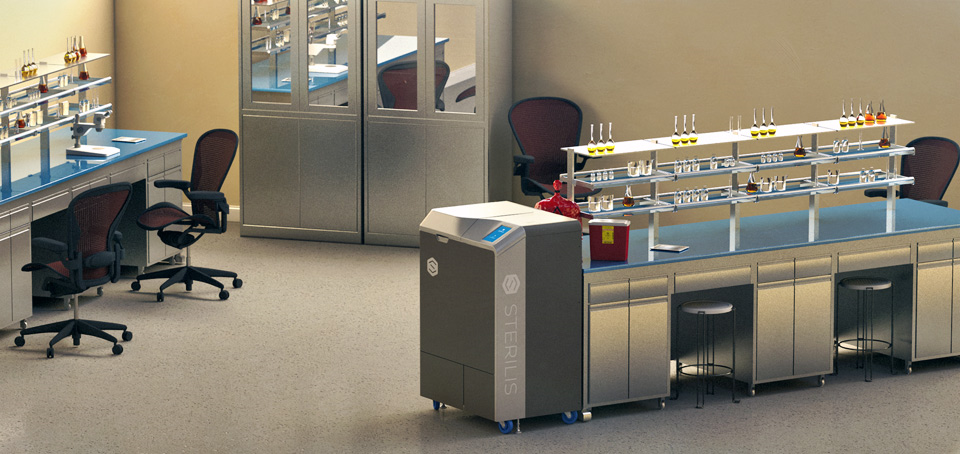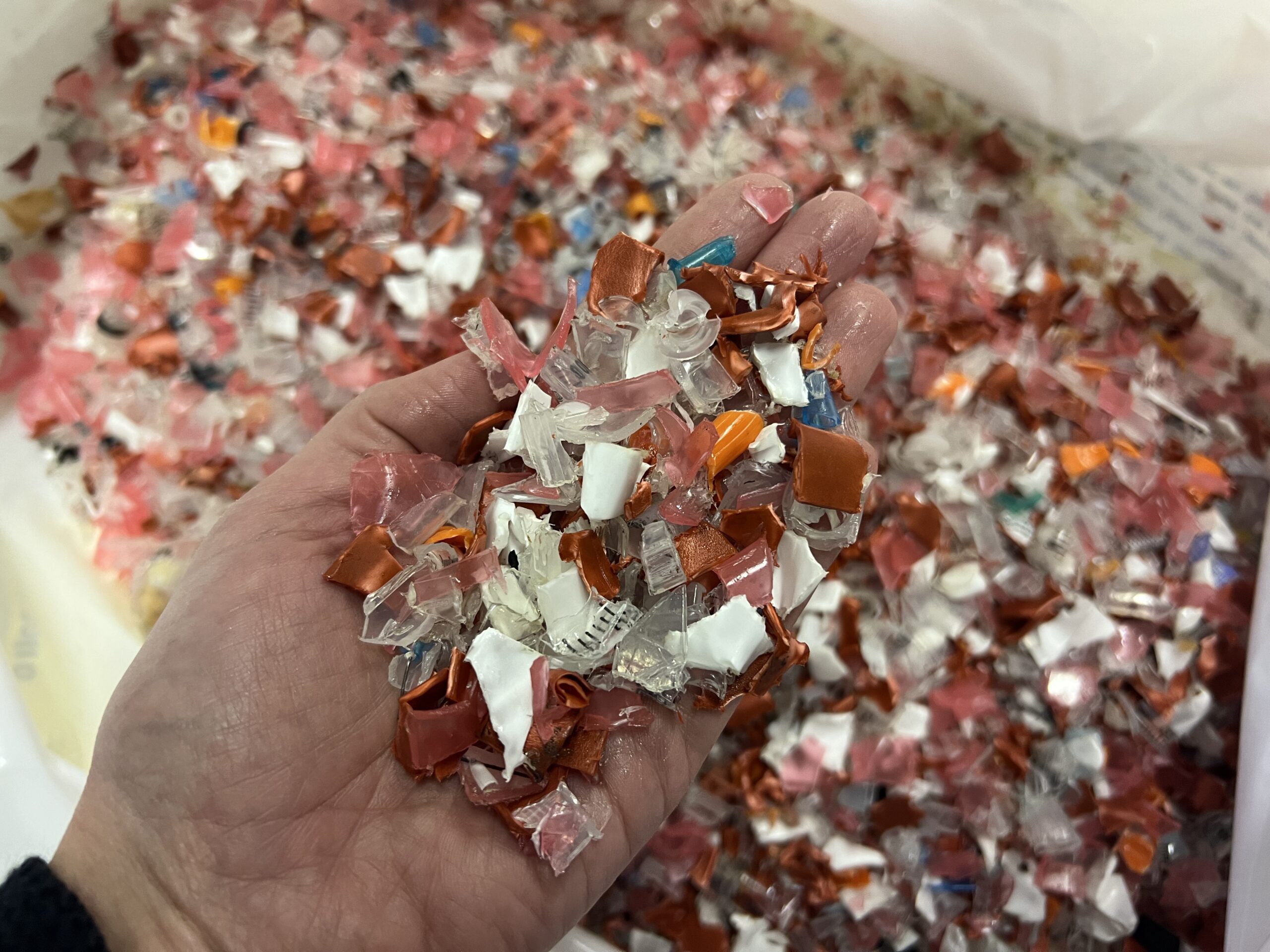April 11, 2024
Pioneering Sustainable Solutions: The Future of Biohazardous Waste Management in Life Science

Sterilis Solutions’ Remediator machine shown in a lab setting. Image courtesy of Sterilis Solutions.
By Dakota C. Henricksen, Sterilis Solutions
In the healthcare and life science sector, the management of biohazardous waste presents both a critical challenge and an opportunity for innovation. As the global population grows and medical advancements continue, an increase in single-use plastics and the volume of biohazardous waste generated by laboratories has escalated, posing significant environmental and public health concerns. Sterilis Solutions is revolutionizing biohazardous waste management, offering a sustainable solution that minimizes environmental impact while ensuring the safety of laboratory personnel, healthcare workers, and the community at large.
Current Challenges in Biohazardous Waste Management
Traditional methods of biohazardous waste disposal, such as incineration and standard autoclaving, are not only environmentally harmful but also resource intensive. Incineration releases harmful pollutants and greenhouse gases into the atmosphere, including dioxins, furans, and mercury, which can have adverse effects on air quality and human health, while standard autoclaving consumes significant energy. Moreover, the sheer volume of medical waste generated globally overwhelms landfill capacities, exacerbating soil and water contamination.
The management of biohazardous waste requires significant resources, including energy, water, and transportation. The process of collecting, transporting, and treating medical waste consumes resources and contributes to carbon emissions, compounding the environmental footprint of laboratories. Annually, the life sciences sector produces over *5.5 million tons of plastic waste every year, a significant portion of which ends up in landfills.
Improper handling and disposal of regulated medical waste can pose serious public health risks. Exposure to infectious agents and hazardous chemicals in medical waste can lead to the spread of diseases endangering human health and wildlife, underscoring the urgent need for sustainable alternatives.
The Urgent Need for Change
Considering these challenges, there is a pressing need for innovative solutions that prioritize sustainability and environmental stewardship. The escalating environmental crisis posed by biohazardous waste prompts an urgent call for transformative change within the life science industry. It is imperative that laboratories adopt sustainable waste management practices that minimize environmental harm and promote ecological resilience. Sterilis Solutions recognizes the need for change and is dedicated to pioneering innovative solutions that align with these principles.
So How Do We Make the Change?
Sterilis Solutions offers cutting-edge technology in the Remediator, which transforms biohazardous waste into harmless, confetti-like material, eliminating the need for incineration or off-site transportation. Through strategic partnerships with industry leaders like Millipore Sigma, Sterilis Solutions conducted a comprehensive life cycle assessment, quantifying how the Remediator supports environmental sustainability goals and the impact on carbon emissions and energy demand from waste processed through the Remediator. **When compared to autoclave, operation of the Remediator has 95 percent fewer carbon emissions and 90 percent less energy demand. This means that for every 1 pound of waste processed through the Remediator, 1 pound of carbon emissions is saved. Pound for pound, the Remediator greatly minimizes environmental impact compared to traditional methods.

Regulated medical waste after being processed through Sterilis Solutions’ Remediator. The Remediator, a system about the size of a Xerox copier, allows companies to remediate regulated medical waste, specifically red bag waste and sharps containers, at the point of care and transforms it into harmless confetti. Image courtesy of Sterilis Solutions.
Advancing Sustainability: The Era of Advanced Recycling in Waste Management
Beyond merely processing waste through innovative technology like the Remediator, Sterilis Solutions is establishing the concept of circular economy principles within the life science sector. By incorporating advanced recycling techniques, waste material processed through the Remediator can be transformed into reusable resources, further reducing the environmental footprint associated with biohazardous waste disposal. This futuristic approach not only minimizes waste generation but also maximizes resource efficiency, contributing to a more sustainable and resilient biotech ecosystem.
Transitioning to Sustainable Biohazardous Waste Management
Transitioning from relying on a conventional biohazardous waste hauling company to adopting Sterilis Solutions necessitates a multifaceted strategy grounded in creativity, partnership, and a steadfast commitment to environmental stewardship. Laboratories need to assess their current waste management practices and identify areas for improvement, recognizing the environmental and operational benefits offered.
The Consequences of Inaction
Failure to address the environmental impact of biohazardous waste management poses dire consequences. The future of biohazardous waste management hinges on innovation, collaboration, and a commitment to sustainability. Sterilis Solutions stands at the forefront of this transformation, dedicated to leading the charge towards a greener, more sustainable life sciences sector. Through their cutting-edge technology and strategic partnerships, they are revolutionizing the landscape of biohazardous waste management. By implementing environmentally responsible practices and harnessing the power of advanced technology, they choose to safeguard the environment and protect the health and well-being of future generations, ensuring a healthier and more sustainable world for all.
*“How Much Waste Does Science Produce?”Labmate Online
**Based on Plastic Waste Life Cycle Assessment, Pure Strategies, March 2023, for Millipore Sigma & Sterilis Solutions